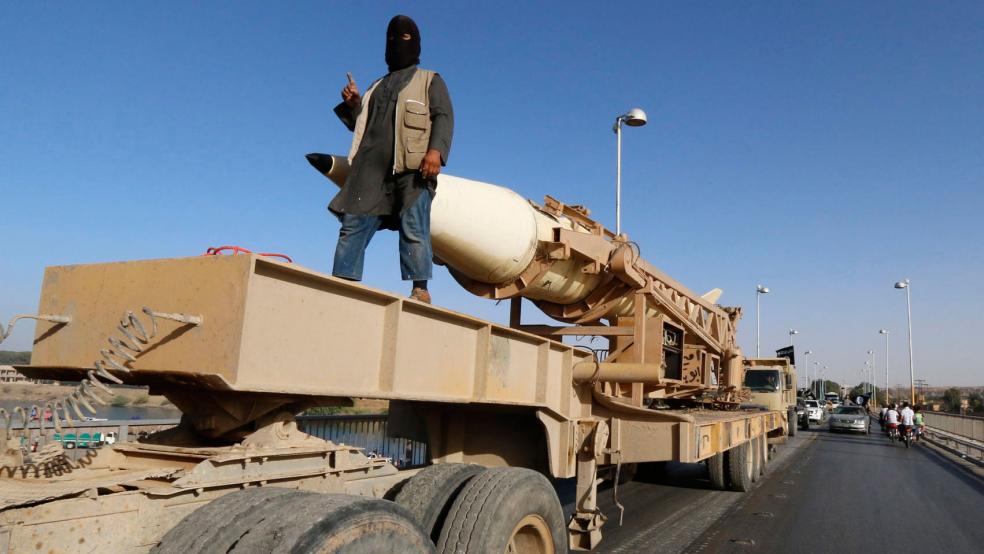After five months of a U.S.-led air bombing campaign and two months of defeats on the ground in Iraq, ISIS, the terror organization, has turned against the very people that it claimed it was protecting: Iraqi Sunnis.
Iraq’s Arab Sunnis, who make up 20 percent of the population, have ruled the country since it gained independence from the U.K. in 1932. When American forces toppled Sunni President Saddam Hussein in 2003, many Sunnis joined the insurgency that has since claimed hundreds of thousands of lives. Yet, over time ISIS has managed to alienate some of this population.
Now, the Iraqi Sunnis are the critical swing group for the U.S.-led alliance to defeat ISIS in Iraq. If the Sunnis turn against ISIS, the alliance’s mission would be accomplished. If not, the Iraqi front will be lost.
Related: U.S. Troops Teeter on Edge of Iraq-ISIS Battles
Major loyalties have shifted since this summer. Many Iraqi Sunnis welcomed ISIS victories in June 2014. They considered Shiite former Prime Minister Nuri al-Maliki a corrupt sectarian. But within a few months, ISIS’s brutality towards all groups, its extreme interpretation of Islam, its failure to provide public services, its displacement of 2 million Iraqis – largely Sunnis — and the vast destruction of public and private properties in the country’s Sunni areas caused many ISIS sympathizers to turn against the terror group.
One turning point among the Iraqi Sunnis was the annual celebration of the birth of the prophet Muhammad that passed several days ago. It is considered one of the most important days in the Islamic calendar. But while Prime Minister Haider al-Abadi, also a Shiite, participated personally with the Sunnis of Baghdad in their celebration, the residents of the ISIS-controlled city of Mosul were prohibited from arranging a similar ceremony.
ISIS’s increasing brutality toward Sunnis is a show of weakness. The real calling card of the terrorist group is violence and intimidation, and when the organization is threatened, it adopts harsher tactics. Public executions are meant to shock communities into obedience, and where ISIS is able to hit citizens hardest is in tribal areas. On Saturday, ISIS militants reportedly executed 15 men of the Sunni al-Jumaila tribe. The execution took place in public in al-Garma, a town located near the ISIS stronghold of al-Fallujah in al-Anbar province, 25 miles to the west of Baghdad.
The largest public executions to date occurred two months ago, when ISIS killed hundreds of men, women and children of the Albu Nimr tribe in the city of Hit, 130 miles to west of Baghdad. The execution was a show of revenge after the tribe’s fight against ISIS throughout the last year. It was also the first time that ISIS committed mass murder against Sunnis. Now, it is feared that 45 other men who were arrested from the al-Jumaila tribe will face the same fate.
Related: 9 ISIS Weapons That Will Shock You
Kidnapping Sunnis has become more another regular tactic. ISIS members have kidnapped 170 Sunnis of the al-Jobour tribe from two villages about 120 miles to the north of Baghdad in Kirkuk province. They were kidnapped after burning ISIS flags in the villages. “Al-Jobour tribe is subjected to a genocide by ISIS,” said Marwan al-Jbara, a local leader of the tribe. Local tribal leaders in the area managed to convince ISIS to release them, except for one man believed to be the person who burned the ISIS flag.
And the arrests and brutality keep coming. Even as 169 people were being released in al-Hawija, ISIS members arrested 80 men of another Sunni tribe in a village to the east from the city of Tikrit. The residents there had expelled ISIS members from that village three months ago.
Moreover, ISIS militants arrested more than 50 men in the city of al-Shirqat, in Salahuddin province, 200 miles to the north of Baghdad. The men are believed to be former policemen and public servants. Al-Shirqat is strategically important as a crossroad city connecting the provinces of Nineveh, Kirkuk and Salahuddin to the north of Baghdad. It is also one of the few cities in Salahuddin that wasn’t attacked yet by the Iraqi government forces.
While ISIS has killed and arrested Iraqi Sunnis before, this recent campaign of intimidating arrests aimed at Sunnis is by far the first nationwide effort to keep the Iraqi Sunni in line.
Related: ISIS May Be Executing Its Own Fighters
While ISIS is still the dominant force in al-Anbar province to the west of Baghdad, controlling most of the province’ cities and towns, it is losing ground in Salahuddin and Nineveh provinces to the north of Baghdad. In Salahuddin, the Iraqi government forces and the Shiite militias have launched a massive campaign in the last few weeks. They have finally broken the sieges that ISIS imposed around the southern part of the Sunni town of al-Dhuluiya, the city of Balad and the town of al-Dujail, located 50, 60 and 40 miles to the north of Baghdad respectively.
Despite all these victories, the Iraqi government has still not been able to clear the provincial capital Tikrit, the hometown of former dictator Saddam Hussein, even after six months of continuous attacks. But ISIS’s increasing brutality toward Sunnis could ultimately make it easier for Iraqi forces to retake that town and other Sunni strongholds.
Top Reads from The Fiscal Times:





